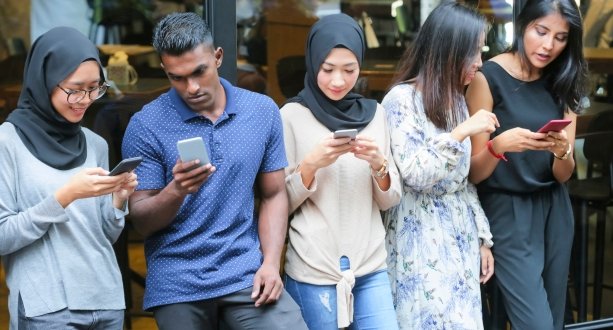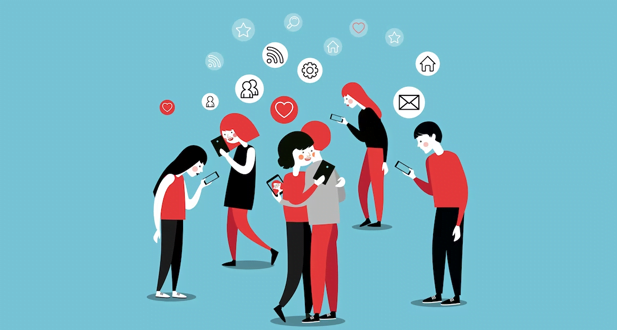About mobile addiction:
Smartphone addiction has become a common term, and researchers have dubbed it phone addiction. It is defined as an excessive overuse of the smartphone and its associated applications, internet usage, and social media platforms. While there is debate over what constitutes problematic smartphone use, some proposed characteristics of problematic smartphone use are: having a mobile phone with you at all times, feeling anxiety or fear when separated from the device, experiencing psychological or behavioral dependence on the device, difficulty in limiting cell phone usage even when attempting to do so. Research has shown that overuse of cell phones can lead to dependency and potential problems such as fear of missing out (FOMO) or excessive internet usage.
Referred to as ‘cell phone addiction’, it is a type of behavioral addiction which can lead to severe impairment and distress. Many mental health professionals have acknowledged the chronic use of cell phones as a potential behavioral addiction, similar to shopping, video game addiction and internet gambling. It is an impulse control issue that has been studied by many medical professionals and researchers. Problems associated with problematic mobile phone use can lead to significant problems in both physical and mental health.
Smartphone addiction is considered excessive smartphone use which can lead to a variety of other addictions, such as internet addiction and other forms of behavioral addiction. Recent studies have analyzed the psychological behavior of adolescents and their brain and subjective measures in relation to smartphone addiction. Researchers examined the behavior, social relationships, and adolescent brain development in relation to excessive smartphone use. Studies without baseline measures were analyzed to determine the causal role of mobile phone usage on adolescents’ physical health and wellbeing. The results indicated that excessive smartphone use can lead to behavioral addictions in adolescents.
A recent study scanned the brains of 47.2% of participants who were addicted to their smartphones, and found that they experienced heightened dopamine levels when using their phones. The study also scanned the brains of gaming users and mobile shopping users, which revealed that both groups showed signs of increased phone time in comparison to non-users. Furthermore, the results indicated that approximately 49% of participants used their phones to communicate via text messages and social media more than they did for other activities such as taking photos or videos.
Smartphone addiction occurs when smartphone use becomes excessive and it affects our health, relationships, and daily activities. It is important to be mindful of our smartphone usage to help prevent it from becoming an addiction. Using smartphones for entertainment or to stay connected with others can be beneficial, but when it becomes excessive it can become a problem.
Several studies have shown that excessive use of smartphones can lead to compulsive use, which can cause a person to neglect other aspects of life such as hobbies, social pursuits and even family. It is important to reassess your smartphone use and be aware of how often you check your phone and ignore friends around you when reading facebook updates or playing games on smartphone apps. Gambling apps are especially dangerous as they can lead to an addiction that has a negative impact on the individual, not just financially but also in terms of their relationships with others.
Mobile addiction control:
Parental control can be used to limit the amount of time spent on smartphones and other mobile devices. Measures such as setting limits on the number of hours spent using a smartphone or limiting access to certain apps can help reduce addiction among adolescents. The study also asked teens about their feelings of social support among peers who used smartphones. Findings showed that teens who felt more supported by their peers had less tendency towards smartphone addiction and depression.
Mobile addiction control is a strategy used to limit people’s smartphone use. This strategy is designed to help people overcome their smartphone addictions and be more mindful of their smartphone use. A study conducted by Microsoft involving original participants and their smartphones, showed that restricting people’s phone usage could lead to them experiencing withdrawal symptoms, such as anxiety and restlessness when using their phones. The study followed three phases: selecting the participants, restricting the device usage of the participants for three consecutive days, and monitoring how they were affected during these periods. The first phase of this study involved choosing the right participants: those with self-control problems, high levels of anxiety or depression, and those who spent considerable amounts of time on their phones each day. The second phase was carried out by placing strict restrictions on the participants’ devices for three consecutive days – this included limiting access to certain applications or cutting off access completely. During this period, the researchers monitored how each participant reacted to these restrictions.
Several studies have shown that the use of smartphones can exacerbate smartphone addiction, and it is important to understand your own smartphone use. Through the usage of control-oriented management, people can curb their habits and alter their devoted use of smartphones. This will help them to regain control over their time and limit their addition to these devices. It is especially important that parents take note of this and be aware of their children’s use.
Mobile addiction control is a term used to describe the steps taken to reduce your addiction to your cell phone. Consider deleting most distracting apps, and leaving your phone at home when possible. Checking your cell phone too often can be a sign of addiction, so try to limit the amount of time you use it each day. Apps can also be set with app limits, which will restrict how long you can use them each day.
Smartphone impaired activities have become a major issue for the average smartphone user. Research shows that the majority of people use their phone more than they would like, and many users experience withdrawal symptoms when not using their device. This suggests that there is a risk to users in terms of overusing their device, and having difficulty controlling its use. To help reduce this risk, some apps allow users to set limits on how much time they spend using their device each day.
Why not to get addicted to mobile:
It is well known that using cell phones can result in addiction-like symptoms and reported mental health issues. It is particularly problematic for adolescents, as their impulsivity and lack of impulse control make them more prone to developing an addiction to their phone. This has been supported by other claims that playing computer games or using the internet excessively can lead to depression in young people. Mental health professionals have also noted that anyone’s use of a cell phone can lead to issues such as anxiety, low self-esteem and depression. Agreeing researchers have also found that making calls and sending messages with cell phones can be associated with mental health problems.
Having cell phone addiction can lead to depression and anxiety, social withdrawal, and stress. Common phone addiction issues include depression, anxiety, aggression, and self-harm. Research has found that declining brain connectivity has been linked to harm to poor sleep quality which in turn can result in worse educational results and lower grades. Poor sleep can also lead to increased stress levels which could potentially worsen educational results. Furthermore, cell phone addiction has also been associated with negative effects such as depression, aggression, and anxiety.
As a result, it is important to keep in mind that cell phone addiction can be just as dangerous as any other type of addiction. Smartphone use has been strongly fueled by the advances in technology and its ever-increasing presence in people’s lives, leading to a fear of not having access to their devices and being unable to stay connected. This phenomenon has been dubbed “nomophobia” or “fear of being without a mobile device”. It is now widely accepted that there is such a thing as “problematic smartphone use” which can lead to an addiction disorder.
Just like heroin or tobacco addiction, smartphone addiction is a behavioral addiction. Smartphone apps are so pervasive in our lives that it has been found that people who use smartphones can become dependent on the internet, neglecting other aspects of life such as hobbies and social pursuits. It is believed by many in the field that smartphone use can cause apps to be used compulsively and can lead to severe associated health problems. The severity of the associated health problems have been acknowledged when it comes to chronic phone use and compulsive use. Smartphone addiction is becoming a major issue with some researchers believing that it should be classified as an official mental health problem.
Studies have shown that using your phone before going to sleep can result in addiction and lack of sleep. A study from psychiatry scanned researchers found that 39% of kids with mobile devices feel 50% addicted to their phones, and 59% of teens believe that they are addicted. Common sense media also scanned their database and found out that kids between 8-18 years old spent an average of 9 hours a day on their phones. The use of mobile devices has become a popular culture mis-conception, as many feel like they cannot live without it. However, using your phone excessively can be detrimental to your mental health and physical wellbeing. Therefore, it is important to practice common sense when it comes to phone use, as the time spent on the device should be limited each day in order to avoid getting addicted.
How to overcome mobile addiction:
- Firstly, reassess your smartphone use
- Secondly, think about why you’re using your phone. Is it to stay connected with friends and family, or is it out of boredom?
- Thirdly, set limits on the amount of time you spend using your phone.
- Fourthly, keep track of how often you use your phone. Set a goal to reduce the amount of times per day that you pick up your device.
- Fifthly, delete any apps that are distracting or unnecessary.
- Sixthly, turn off notifications so that they won’t be constantly interrupting you when there’s something new to check out on social media.
Push notifications can be a major distraction and make it hard to focus on your work or other activities. Seventhly, put your phone away in your bag, or even better, leave it at home when you go out. This will help you to stay focused and spend less time on the phone. Finally, if you find it hard to stay away from social media and other apps, there are apps like Space that can help by setting app limits and monitoring your smartphone use. By following these steps, you will be able to overcome mobile addiction and spend less time on distracting apps while still being able to enjoy using social media.
First, you should check your cell phone only at specific times throughout the day and evening. Vibrate your phone so that you don’t hear notifications, and turn off email and Facebook notifications. This will reduce the temptation to check your phone constantly. Set specific times for using your cell phone throughout the day, which could mean allotting a few minutes in the morning, afternoon, and evening. Use your phone when you need it during work or school hours, but make sure to avoid multitasking while studying or working.
It can be helpful to pick certain hours when you will use your cell phone and not let it distract you from the task at hand. People often limit their cell phone use by putting their phone away at night and only taking it out for necessities during the day. This is a common way people try to overcome mobile addiction. Another common way people try to overcome mobile addiction is to limit work related emails and text notifications, as this takes too much effort.
This can be done by using particular apps that can help one target one’s phone usage. By checking the number of hours spent on your phone, you can set a limit of how much time you want to spend on your device. Limiting your usage to a few days and then gradually increasing it to 30 days is a good way to start. This will help control the amount of time one spends on their phone and help combat mobile addiction.
To overcome mobile addiction, it is important to recognize the symptoms of an unhealthy coping mechanism such as withdrawals like irritability and anger. These can make screen time problematic. It is also important to understand that a desire for low tolerance and abuse of the phone can lead to changes in excessive desire. To avoid phone addiction, it is important to be aware of the inability to control usage and look for larger problems which may be expressed in a negative way.




